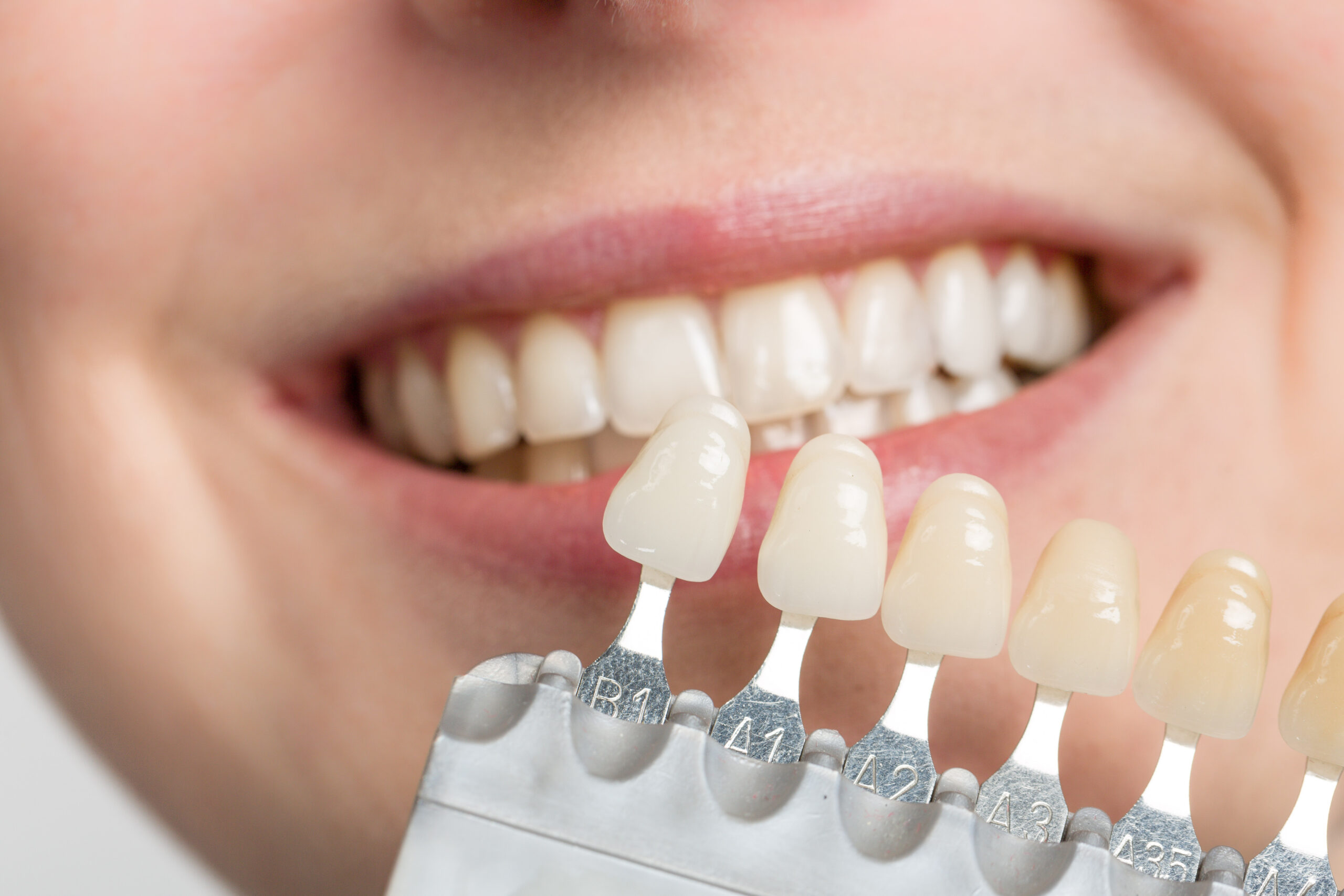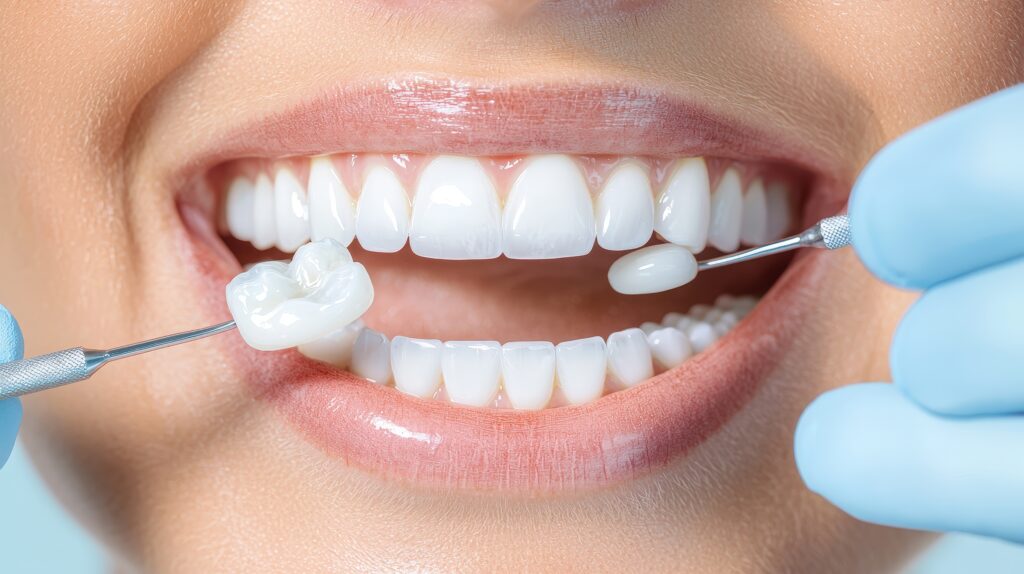
14 Apr What Happens To Teeth Under Veneers?
Veneers have become one of the most sought-after cosmetic dental treatments in the UK, and it’s easy to see why. They offer a fast and transformative way to improve the appearance of your teeth, giving you a brighter, straighter, and more confident smile. But while many people understand what veneers look like on the outside, a common question we hear from patients is: what actually happens to the teeth underneath? It’s an important concern, especially for those considering this treatment for the first time. Whether you’re based in Yeovil or elsewhere in the UK, it’s vital to understand how veneers interact with your natural teeth, both in the short term and over time. In this blog, we’ll explore the relationship between veneers and the underlying teeth, what preparation involves, how the teeth are protected, and how to ensure your smile stays healthy for years to come.
Understanding the Basics: Veneers and Natural Teeth
Dental veneers are ultra-thin shells, usually made from porcelain or composite resin, that are bonded to the front surface of your teeth. They’re designed to enhance the appearance of your smile by covering imperfections such as chips, gaps, discolouration, and minor misalignment. While veneers are cosmetic in nature, they are bonded directly onto your natural teeth, so what’s underneath plays a crucial role in the success and longevity of your treatment. Contrary to what some might believe, veneers do not completely replace your natural teeth. Instead, they work in harmony with them. The teeth beneath veneers are still functional and alive. This means that maintaining the health of these underlying teeth is just as important as taking care of the veneers themselves.
What Happens to Your Teeth During the Veneer Process?
The process of getting veneers involves some preparation of your natural teeth. This typically includes the removal of a thin layer of enamel from the front surface of each tooth that will be receiving a veneer. This step is necessary to create space for the veneer, ensuring it sits flush and looks natural without appearing bulky or overly white. This enamel removal is usually minimal—roughly 0.3 to 0.7 millimetres—but it is permanent. Once enamel is removed, it doesn’t grow back, which is why veneers are considered a non-reversible procedure. However, because the reduction is so slight and carefully controlled, it doesn’t compromise the strength or structure of the tooth when performed by a qualified dentist. Once the teeth are prepared, impressions are taken, and your custom veneers are made to fit perfectly. In the meantime, temporary veneers may be fitted to protect your teeth. These temporary covers also give you a sense of how your final smile will look and feel.
Are the Teeth Under Veneers Still Alive?
Yes, the teeth under veneers remain very much alive. In most cases, the nerve and internal structure of the tooth are untouched during the veneer preparation process. This means your teeth still have their natural function and sensitivity. You’ll still feel sensations such as hot and cold, and your teeth are still susceptible to decay or damage if not properly cared for. Because the tooth underneath is still active, good oral hygiene remains essential. Brushing, flossing, and attending regular check-ups will keep both the veneer and the natural tooth in excellent condition. Veneers can mask imperfections, but they don’t protect against gum disease or cavities forming at the edges of the veneer, where the tooth is still exposed.
Can Veneers Damage Your Teeth?
When done properly, veneers should not damage your teeth. At Hendford Dental Practice and many other reputable clinics across the UK, dentists take a conservative approach to enamel removal. The aim is always to retain as much of your natural tooth as possible. The bonding materials used to attach veneers are strong and biocompatible, meaning they won’t harm your teeth or gums. Problems usually arise when veneers are poorly fitted, too much enamel is removed, or the bite isn’t properly aligned. That’s why it’s so important to choose a skilled cosmetic dentist with experience in veneer placement. A poorly fitted veneer can lead to tooth sensitivity, increased risk of decay, or even the need for more invasive treatment like crowns or root canals later on.
How Do You Care for Teeth Under Veneers?
Caring for the teeth underneath your veneers is very similar to caring for natural teeth. You should brush twice daily using a soft-bristled toothbrush and a non-abrasive toothpaste. Flossing daily is just as crucial, as it helps to prevent plaque build-up between teeth and along the gumline. Using an alcohol-free mouthwash can also help maintain oral health without compromising the veneer bond. Regular dental check-ups are key. Your dentist will check the integrity of the veneers, ensure your gums remain healthy, and monitor the underlying teeth for any signs of trouble. Just because your teeth look flawless on the outside doesn’t mean they don’t need the same attention and care as before. It’s also wise to avoid habits that could damage either the veneers or the natural teeth underneath. Chewing on pens, biting your nails, or grinding your teeth at night can all put undue pressure on your veneers and weaken the bond to the underlying tooth. If you’re prone to grinding, your dentist might recommend a custom night guard to protect your smile while you sleep.
What If Something Goes Wrong with the Tooth Underneath?
In rare cases, the tooth under a veneer can develop issues such as decay, infection, or trauma. When this happens, your dentist may need to remove the veneer to treat the tooth beneath. Fortunately, in many cases, the veneer can be replaced once the tooth is healthy again. It’s also worth noting that veneers are not designed to fix underlying dental problems. If you have decay, gum disease, or structural damage, these will need to be addressed before veneers are applied. A responsible cosmetic dentist will always carry out a full assessment and may take X-rays to ensure your teeth and gums are healthy enough for veneers.
The Long-Term Relationship Between Veneers and Natural Teeth
Veneers are designed to be a long-term solution, but they’re not permanent. Over time, veneers can wear down, chip, or become discoloured at the edges. Most porcelain veneers last between 10 to 15 years, while composite veneers may need replacing sooner. What’s important is the condition of the tooth underneath. If the natural tooth remains healthy and intact, replacing the veneer is typically a straightforward process. This is why maintaining good oral hygiene and visiting your dentist regularly is so important—not just for the veneers, but for the longevity of your natural teeth beneath them.
Choosing Veneers with Confidence
Getting veneers is an exciting step towards a brighter, more confident smile. And while they sit on top of your natural teeth, what happens underneath is just as important as the appearance they create. At Hendford Dental Practice in Yeovil, we focus on preserving the health of your teeth while enhancing your smile with beautifully crafted veneers. When done properly by experienced professionals, veneers do not harm your natural teeth. In fact, with the right care and maintenance, your teeth can remain strong, functional, and healthy underneath your veneers for many years. If you’re considering veneers and want to ensure your smile is in safe hands, our team in Yeovil is here to guide you every step of the way. Contact us today.




Sorry, the comment form is closed at this time.